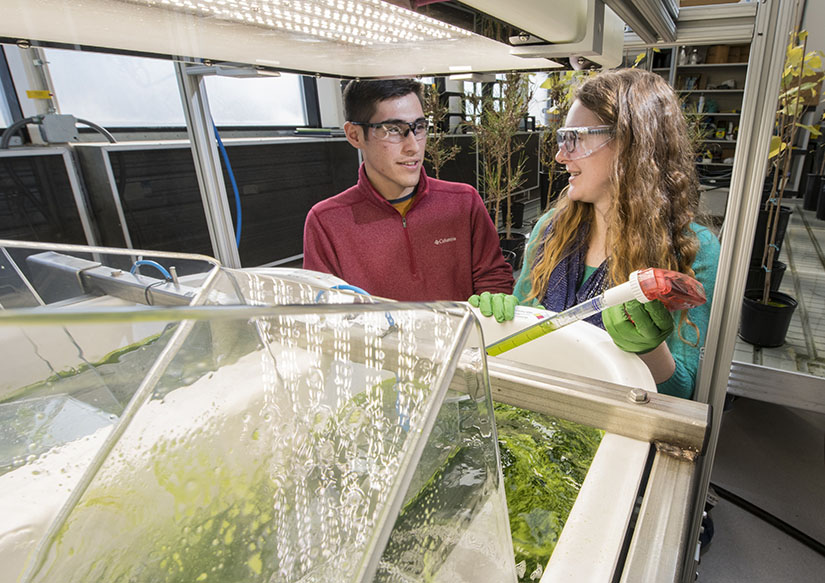AlgaePrize Student Finalists Announced
Competition Challenges Students To Create Novel Solutions for Real-World Issues in the Algae Value Chain

The U.S. Department of Energy’s Bioenergy Technologies Office (BETO) announced 15 student teams advancing as finalists in the 2022–2023 AlgaePrize competition. Finalist teams receive $5,000 to conduct their proposed research projects over the next 16 months and will present the results next year at the National Renewable Energy Laboratory (NREL).
“Spring is in the air, but we are already looking forward to spring next year, when we host the AlgaePrize finalist teams at NREL in April 2023,” said Zia Abdullah, NREL laboratory program manager for BETO. “As a global leader in cutting-edge algae research, NREL develops value chains spanning the production of algae biomass all the way to market-competitive fuels and products. Our strategic research and industrywide collaborations will provide impactful opportunities for students to collaborate with scientists to further develop green solutions for our planet and make immediate market impact.”
The AlgaePrize is sponsored by BETO and supported by the Algae Foundation and NREL. The competition fosters the next generation of bioeconomy professionals by encouraging students to develop innovations that support large-scale algae commercialization. Algal biomass can be used to produce billions of gallons per year of economical, renewable diesel and jet fuels, as well as recycle carbon dioxide, provide nutritious food, and create jobs.
Competition Research Topics
Competition interest areas cover both microalgae and macroalgae. Student team proposals focus their projects on innovations that apply to algae production, downstream processing, and new product or analytical tool development.
- Algae production includes cultivar enhancement, aquaculture engineering, and husbandry and productivity.
- Algae downstream processing encompasses harvesting and biorefinery application development.
- Algae products and tools include fuel, food, animal feed, and industrial compounds, as well as computational modeling and remote sensing.
Finalist Teams
Congratulations to the finalist teams:
- Algaeorithm: Los Altos High School, Los Altos, California; The Paideia School, Atlanta, Georgia; Institute for Systems Biology, Seattle Washington
- AzCATI: Arizona State University, Tempe, Arizona; New York University, New York City, New York
- The Clean Water Cultivators: Santa Fe Community College, Santa Fe, New Mexico
- The Cyantific Method: Colorado State University, Fort Collins, Colorado
- FitoEnergy Team: University of Puerto Rico, Rio Piedras, Puerto Rico
- Keep Calm and Chlamy On: University of California San Diego, La Jolla, California
- Kelp! I Need Some Algae: University of Alaska Fairbanks, Fairbanks, Alaska
- PhycoSight: Georgia Institute of Technology, Atlanta, Georgia
- Polyculture Jam: Austin Community College, Austin, Texas; University of Texas at Austin, Austin, Texas; Del Valle High School, Del Valle, Texas; Humboldt State University, Arcata, California
- Pond Doctors: California State University Monterey, Seaside, California; California State University San Jose, San Jose, California; Cabrillo College, Aptos, California; Moss Landing Marine Laboratories, Moss Landing, California
- PUPR AlgaePrize Team: Polytechnic University of Puerto Rico, San Juan, Puerto Rico
- Purdue ChemE: Purdue University, West Lafayette, Indiana
- Toxic Ambrosia Salad: Santa Fe Community College, Santa Fe, New Mexico; Delgado Community College, New Orleans, Louisiana
- UC Davis Giant Kelp Team: University of California Davis, Davis, California
- Underground Ocean Farmers: Santa Fe Community College, Santa Fe, New Mexico
Preparing Students for Bioeconomy Workforce
Finalist teams submitted 10-page research synopses that described how their proposed research compares to and would advance the current state of technology. With students ranging from high school through graduate programs, the AlgaePrize is helping establish the competitors as serious candidates for the next generation of bioeconomy positions and entrepreneurial opportunities.
The 15 student finalist teams will present their research at the AlgaePrize Competition Event in April 2023, and the five selected as AlgaePrize winners will win $10,000. A grand champion team will win an additional $5,000. The five winning teams will then attend the Algae Biomass Summit to present their research and network with participants from the national and international algae community.
“While algae technologies have so much potential to make an impact supplying future carbon-negative fuels and products, fresh ideas are critical to make sure we leave no stone unturned in coming up with sustainable solutions for culturing and also for taking advantage of every component of the biomass,” said Lieve Laurens, a senior researcher and lead of NREL’s algae platform. “This competition is a great step in the right direction, and sourcing ideas from all corners of the field will help to think outside the box and will help make a carbon-efficient and carbon-negative future a reality.”
Learn more about the finalist teams, including summaries of their projects on the BETO website. For questions about the AlgaePrize, email [email protected].
Last Updated May 28, 2025
